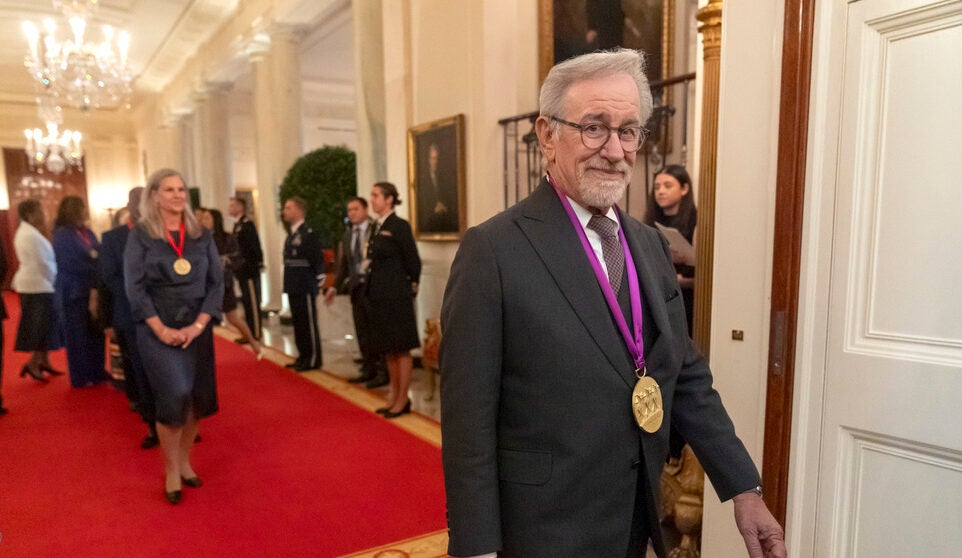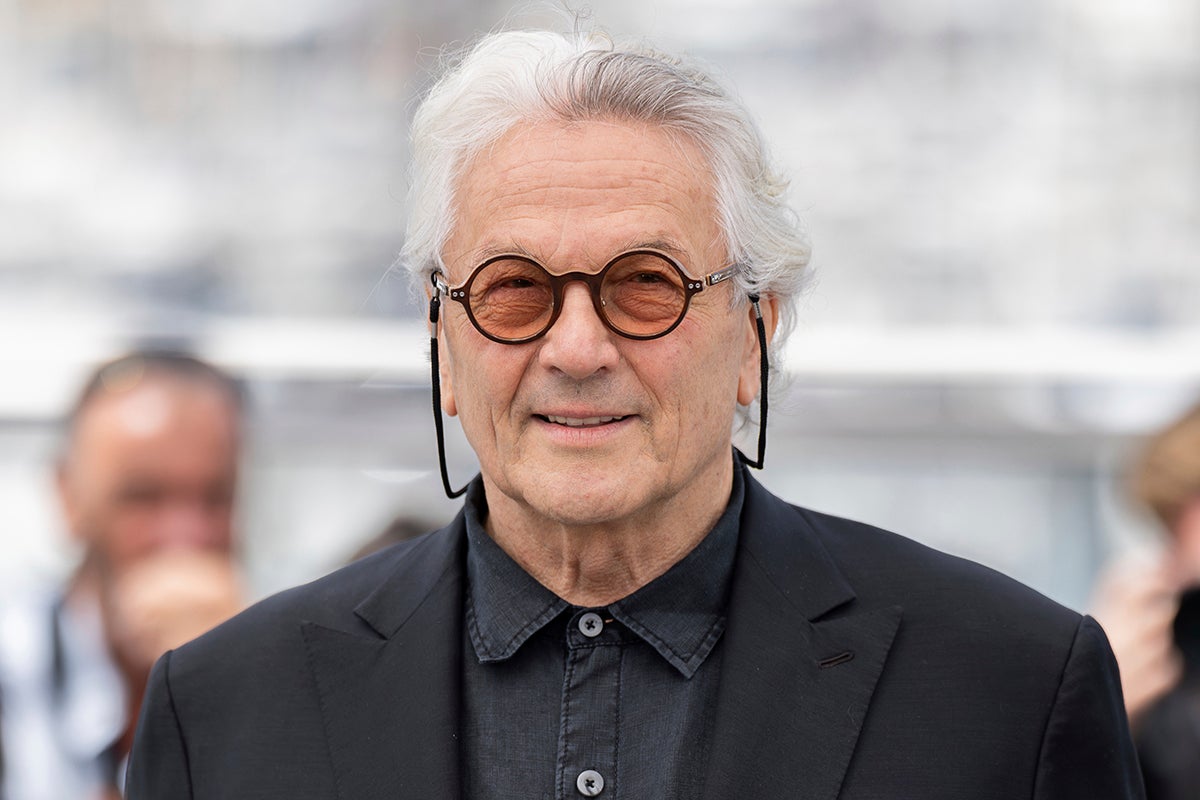Actor Gabriel Byrne on his memoir, “Walking with Ghosts.” Also, writer Sasha Geffen talks about music and gender. And film critic Ian Nathan on the life and career of the great director Ridley Scott.
Featured in this Show
-
Actor Gabriel Byrne Walks With His 'Ghosts' In New Memoir
In 1995, at the Cannes Film Festival, a crime film called “The Usual Suspects” was screened for one of its first audiences. The film was instantly dubbed the talk of the festival and would go on to become a pop culture landmark in the ensuing years. But the film’s lead, Gabriel Byrne, told WPR’s “BETA” he had a far different reaction to the acclaim.
“I had what a lot of people might call a panic attack in the sense that I saw instantly how the world around me changed in that room,” Byrne recalled. “I left the film festival in the middle of a press conference and I went to my hotel room 50 miles away and locked myself in a room for three days.”
This stark reaction to overnight global fame and the pushback against it is a recurring theme in Byrne’s memoir, “Walking with Ghosts.” Byrne — who deemed acting as the ultimate vocation for a kid with a vivid imagination — was quite satisfied with his career as a working actor.
“It’s a wonderful way to express yourself, but it ends at five o’clock when they say wrap,” said Byrne. “Young actors will say, ‘Do you have any advice?’ And it’s the advice that in relation to acting, and I think it’s true of other things too, don’t confuse work for life because it’s not. It’s a job. Nobody ever lay on their deathbed and said, ‘God, I wish I’d done that movie with George Clooney.’“
Clearly, Byrne wasn’t seeking the heights of fame and all that entails. Part of that perspective comes from his time as an early actor working with his personal hero and legendary actor, Richard Burton, on the mini-series “Wagner” for PBS. Burton, who was hassled at all hours by the paparazzi on the set due to his relationship with Elizabeth Taylor, shared his thoughts on fame to Byrne over a quiet drink.
“He said to me that it’s not that when you’re famous you change. Everybody around you changes. That’s what people have a problem with, because you’re still the same person inside, except everybody is now relating to you in a different way,” Byrne said. “He said it was a poisoned drink, that in the beginning you drink it because it tastes really good, and then you need it and you keep drinking it and then it eventually turns to poison.”
Burton would pass away a few years after “Wagner” aired at the age of 58. Byrne, who is now 71, also got to meet another of his acting heroes, Sir Laurence Olivier, on the same series. Nervous and a bit star struck, Byrne attempted to initiate a conversation with Olivier by asking him the time.
“He turned to me and he said, ‘Are they paying you on this?’ And I said, ‘Yes.’ And he said, ‘Then I suggest you buy a watch,’” Byrne said. “I thought, ‘Oh, my God’ and I was like, really upset for days afterwards.”
However, on Olivier’s final day of shooting, Byrne returned to his dressing room to find a handwritten note from the iconic actor.
“Basically, he apologized for being short and being curt in his reply. He said, ‘But I have thought about your question. Do I have the time? And in response to that, I would like to quote you lines from a greater mind than mine.’ And in it he wrote, Sonnet 60, which is Shakespeare’s sonnet about time,” said Byrne. “What he was essentially saying was time is the most precious thing that we have. And yet my idiotic stumbling remark to him provoked his thoughts about how much time he had left in his life.”
Byrne still has the note up in his office today. The sonnet is just one of many pieces of verse and poetry that are sprinkled in Byrne’s memoir. Even the prose of the memoir — which you’d be forgiven for mistaking for a literary novel if you weren’t familiar with its main character — is poetic and moving.
The epigraph is from poet Percy Bysshe Shelley, “Fear not for the future, weep not for the past.” It was Gabriel’s mother’s favorite quote and one the actor thinks about with a different perspective now.
“The only thing that’s real is the present. If you live in fear of the future and you live in regret of the past, you are essentially living in a place that is not good for the soul,” he said.
Byrne says that he tackled some hard truths in the book including some of his personal demons like drinking and some of his early traumas like the tragic drowning of a childhood friend and how grappling with those led him to the necessary empathy for acting.
He also opens up about his brief foray into priesthood at the young age of 11 and how it was sidetracked by sexual abuse. Byrne would go on later in life to confront his abuser only to learn the priest had no memory of ever meeting him.
“What it led me to was the realization that we all expect that life will deliver resolution and that the confrontation with the source will result in a moving on or what they call closure now,” said Byrne. “Life isn’t like that and these are one of the ghosts that I talk about that walk with you through your life. But that doesn’t mean that my life was desperately unhappy because of that. It wasn’t. I’m very lucky in the sense that I did survive. But I know other people who didn’t in one way or another.”
Byrne would parlay his post “Suspects” fame to award-winning work on Broadway and in the pioneering daily HBO show, “In Treatment” and reintroduced himself to a new legion of fans with a role in the 2018 horror sensation, “Hereditary.” However, writing will remain a big part of Byrne’s fearless future. He’s at work now on a novel.
“With a memoir you’re confronted on every page with the truth because what was the point of writing a memoir if you weren’t going to tell the truth? So with a novel, you have more freedom to hide behind characters,” said Byrne. “I’m enjoying being free enough to be able to do it.”
-
How Pop Musicians Transcend Strict Gender Roles
These days, we hear a lot about trans rights and the importance of recognizing nonbinary and third-gender identities. Writer Sasha Geffen hears even more. They are the author of the book “Glitter Up The Dark: How Pop Music Broke the Binary.”
In the book, Geffen explores how popular music’s quality of subliminal expression allows rigid gender constructs to disappear. Musicians like Wendy Carlos, David Bowie, and Prince have used their vivid imaginations to demonstrate that gender is fluid.
“Music as we know it over the past 100 years has been tied really closely to drag,” Geffen told WPR’s “BETA.”
When jazz started to make its mark during the Harlem Renaissance of the 1920s and 1930s, many performers dressed in drag or were openly gay. And as Geffen points out, drag ball culture can be traced back to the 19th century.
In their book, Geffen quotes the following lyrics from the queer performer Perfume Genius’s song, “Don’t Let Them In”:
In an alternate ribbon of time
My dances were sacred
My lisp was evidence
I spoke for both spirits
“Those lyrics speak to this secret current of queer relationality that runs through history, that tends to get scrubbed from history,” Geffen explained. “This idea that queer people have always been trying to seek each other out, and find each other, and find ways to connect, and keep each other alive in ways that aren’t always visible to mainstream record-keeping.”
Geffen says this is like an alternate current of time that is hidden beneath history.
“But it can also speak to maybe alternate pasts or futures, like, what if we lived in a world where being queer was seen as sacred? Just like an alternate ribbon speaks to imagining what the world might be like if we saw them in secret instead,” they said.
One of the musicians Geffen profiles is composer Wendy Carlos.
Carlos was a composer and electronic musician who began working in the 1960s. She worked closely with Robert Moog who invented the Moog synthesizer, which made its debut in 1964. It is considered the most influential synthesizer in history.
Carlos was a trans woman who transitioned around the same time she started releasing her music. She didn’t come out publicly until 1979. Carlos won three Grammy Awards for her 1968 album, “Switched-On Bach,” which featured her interpretations of Johann Sebastian Bach played on a Moog synthesizer. She also composed the scores for “The Shining” (1980) and Walt Disney’s 1982 movie, “Tron.”
One of Carlos’s major accomplishments was the score for Stanley Kubrick’s 1971 film, “A Clockwork Orange,” which includes her interpretation of the “Fourth Movement” from Beethoven’s “Ninth Symphony.”
“It still sounds so fresh and so current,” Geffen said. “But there’s also this kind of amalgam of voices, this sense that one voice becomes many voices at the same time. (Rachel) Elkind’s voice gets pitch-shifted a little bit and overdubbed. It’s a choral piece, there are many different vocal parts. So she’s taking this one singer and making her into a chorus all on her own. And to me, that kind of speaks to something of the multiplicity of trans experience — this illusion of a lot of people singing, when in reality, there’s no one there in the room with you.”
“I think that’s kind of an uncanny phenomenon that pop music is still grappling with,” they continued. “Maybe its uncanniness speaks to this trans feeling of not quite fitting into the world as it is and the need to redelineate the world into something that makes more sense.”
Geffen says Prince was a musician who chased androgyny throughout his career.
“There’s this angelic falsetto that he did,” Geffen said. “And he also lowered his voice to create a chorus of himself.”
They said you can trace some of Prince’s flamboyant persona to his childhood when he was bullied for being too effeminate.
“I think instead of kind of overcompensating and trying to become more masculine, he took it and decided to hone femininity as a strength to see what potential it could hold for him and what potential there was in being a feminine man in public and performing in these very glamorous, high-energy, high-octane kind of ways.”
Prince created a feminine alter ego named Camille. He recorded Camille’s debut self-titled album in 1986. The plan to release the album without any acknowledgement that it was a Prince creation fell through. However, some songs found their way on to a “Sign O’ the Times” box set released in 2020.
“There’s a song I’ve been listening to a lot lately called ‘Shockadelica’, where he sings as Camille, but also about Camille at the same time,” Geffen said. “So he’s kind of describing this character as he’s embodying her.”
Shockadelica, got you in a trance
‘Cause when this woman say dance you dance, Shockadelica
You need a second opinion but you just can’t leave her alone
With her you got no mind of your own
As trans rights continue to reach the forefront of pop culture along with nonbinary identity, how does Geffen see pop music evolving in the future?
“There are a lot of young, queer and trans artists who are making a ton of songs that play with the voice in really chaotic ways,” Geffen said. “You can hear the voice jumping between microtones in a way that’s really discreet. I hear a lot of…fracture and confusion in that music, but also you can part the broken pieces to see a way forward in it.”
-
'Desirability Written Into Their DNA': Critic Explores The Film Worlds Of Legendary Director Ridley Scott
Since his first film was released in 1977, Sir Ridley Scott has created some of the most visually stunning movies in the history of cinema. His filmography stretches from the 1979 science fiction horror film, “Alien” to the 1992 female buddy road movie, “Thelma & Louise” to the 2000 historical epic, “Gladiator.” And in much the same way that his films are so different, Scott is quite different from his fellow filmmakers.
“He’s not interested in his own mythology, he’s not interested in revealing himself,” film critic Ian Nathan, author of “Ridley Scott: A Retrospective“, told WPR’s “BETA.”
Nathan said you have to be on your game when you sit down for an interview with Scott, as he has done on several occasions.
Scott has this trick he plays where he tests your knowledge of film history by pretending to forget something. For example, he once asked Nathan who directed “The Third Man” as if he’d forgotten, and he waited for Nathan to fill the gap. Fortunately, Nathan remembered the film was directed by Carol Reed.
“So if you fail at that, he’ll despair of you,” Nathan said. “But I love it because it’s a very dry sense of humor that sort of underpins his kind of view of the world.”
Before Scott started making films, he set up his own advertising company, Ridley Scott Associates, and made commercials, including the iconic “1984”, which introduced Apple’s Macintosh personal computer.
Scott’s commercial work is probably the most important part of his training because he never went to film school, Nathan explained.
“All of his worlds in feature films have a kind of desirability written into their DNA, even something like ‘Alien’ or ‘Blade Runner,’ which is a dystopia,” said Nathan. “You kind of want to be there, there’s something romantic as well about it. But it’s ruined future. There’s something kind of rather lovely about it at the same time and this comes with that kind of advertising look that he has. It’s sort of an instinct for him.”
“Alien” was Scott’s breakthrough feature film.
Nathan describes it as “a triumph of minimalism” because there’s not much there in terms of scale and scope. There are only three different locations: the commercial spaceship Nostromo; the moon called Acheron (officially known as LV-426) which orbits the planet Calpamos; and the derelict alien spacecraft that Kane (John Hurt’s character) enters and discovers several objects that appear to be eggs.
“And in terms of actually what the plot is, it is simply: pilots of a spacecraft follow a distress beacon; find this alien egg, it stows away within one of them, it breaks out on the spaceship. Will they survive? It’s a B movie. And Scott said so. He said it’s a B movie with an A creature.”
Originally, the protagonist, Ripley, was going to be a man. But the role eventually went to Sigourney Weaver, launching a successful film career in the process.
Nathan describes switching Ripley’s gender as “a feminist statement. It is radical for its time. It reinvented the idea of heroes in science fiction. I think it had a huge effect on cinema and portrayal of women in cinema, certainly in terms of genre. The ripples outwards from ‘Alien’ are massive.”
In 1992, Scott released “Thelma & Louise” starring Susan Sarandon and Geena Davis. The film seemed like a bit of a departure for Scott. He was originally the producer of the film and was excited about Callie Khouri’s screenplay, Nathan explained. At one point, Jodie Foster and Michelle Pfeiffer were going to play the title characters. Pfeiffer told Ridley he had to direct the film because of the passion he showed for it.

Michael Madsen, Susan Sarandon and Geena Davis talk through a scene with Ridley Scott on the set of “Thelma & Louise”. Scott enjoyed every minute of the shoot, describing it as a holiday. Photo courtesy of Palazzo Publishers“Of course, if you look at ‘Thelma & Louise’, it has that advertiser’s glint to it, that kind of glamour even though it’s kind of showing ordinary places or the dust in the air,” Nathan said. “It becomes far more of a Western. We end up in Utah, in John Ford country, the kind of world around them becomes more mythological as they become more outlaw, as they take on this kind of mantle of the couple on the lam.”
“It starts to draw on classic movie tropes as it goes along,” Nathan said. “And this represents their awakening, their sense of sort of coming together and who they are. And that sense, this is this trip of no return that once they cross that line, they’ve gone into this world, they’re not coming back from it.”
Episode Credits
- Doug Gordon Host
- Adam Friedrich Producer
- Steve Gotcher Producer
- Steve Gotcher Technical Director
- Gabriel Byrne Guest
- Sasha Geffen Guest
- Ian Nathan Guest
Wisconsin Public Radio, © Copyright 2025, Board of Regents of the University of Wisconsin System and Wisconsin Educational Communications Board.


